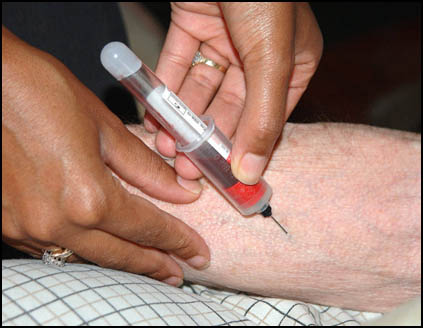 In its Sunday skewspaper article very distastefully headlined Police Are Out for Blood, the Coeur d’Alene Press reported that Coeur d’Alene police officers are being trained and certified as phlebotomists so they can do field blood draws on persons suspected of driving under the influence of intoxicants.
In its Sunday skewspaper article very distastefully headlined Police Are Out for Blood, the Coeur d’Alene Press reported that Coeur d’Alene police officers are being trained and certified as phlebotomists so they can do field blood draws on persons suspected of driving under the influence of intoxicants.
OpenCdA has some concerns and questions we believe must be addressed by the Coeur d’Alene City Council before it applies its obligatory and ceremonial rubber stamp of approval to this proposed practice.
The skewspaper article failed to report what happens to the sample after it has been obtained by the officer. Where and by whom is the actual analysis of the sample performed? What will the Department’s policy be regarding timely delivery of the sample to the testing laboratory?
Of considerably greater concern is the skewspaper article’s implication that this policy and procedure is being proposed to circumvent an existing requirement that officer obtain a search warrant to perform a physiologically invasive, nonconsensual search of a suspect. Our concern is prompted by these lines of the skewspaper article:
If an impaired motorist refuses to submit to a breathalyzer and police have probable cause the motorist is intoxicated, they must get a search warrant to draw blood at a hospital.
“Getting a search warrant takes a while,” Hagar said. “A lot of time, things are too busy and it takes a while.”
By reducing the time — getting a blood draw at the scene — police can get more accurate BACs, which can aid in prosecution, Hagar said.
If a search warrant is required now for a hospital phlebotomist to conduct a physically intrusive, involuntary, and nonconsensual search of the suspect’s body at the hospital, why won’t a search warrant also be required for a law enforcement officer to conduct a physically intrusive involuntary and nonconsensual search of the suspect’s body in the patrol car?
A reasonable inference from the article is that a suspect in the custody of a patrol officer in the field could be persuaded (coerced) into giving “voluntary, informed consent” for a blood draw in the field.
We are also very concerned that some people are, to put it mildly, needle averse. They may be able to tolerate a draw using a blood collection system composed of a multi-sample vacuum collection needle and a disposable tube holder in the hands of an experienced, non-threatening phlebotomist at the hospital. The same equipment system in the hands of an arresting police officer begins to look more like a painful interrogation tool designed to elicit an involuntary admission or involuntary consent.
Are the police going to hold the suspect down while the newly-trained police officer draws blood if the suspect objects to the search? How is that going to look on the video from the body camera? Policy would mandate that from the beginning of the stop through the completion of the involuntary blood draw, there must be an unbroken, clear, and intelligible video image with audio of the entire process. Failure to rigidly adhere to the policy ought to administratively require the exclusion of all BAC evidence by the court in that case as presumptively involuntarily and illegally obtained. In other words, before the evidence obtained from the blood draw is admitted, the court must require the state first prove the blood draw was lawful. The audio-video evidence from the arresting officer’s body camera is the best way to prove that.
What’s next? Police officers trained to catheterize suspects to obtain urine samples? Officers trained to conduct colonoscopies to search for drug packets?





